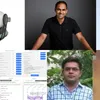This Hyderabad-based startup is offering remote health monitoring services through a connected care platform
Vigocare leverages AI, cloud technology, and biosensor devices to equip patients and doctors with accurate health data, thereby offering remote monitoring services through a dedicated command centre.
One of the first questions that popped in the minds of several Indians when the COVID-19 pandemic struck the country was – “Will the healthcare system be able to meet all the testing and treatment needs?”
This apprehension was a result of a bundle of issues that the sector has been reeling with — from inadequate outlays for public health, the insufficient impetus for research, to the shortage of medical personnel.

According to the Economic Survey released in 2019-20, the doctor-patient population ratio in the country is 1:1456, as oppose to the WHO recommended 1:1000. In fact, this ratio is much lower in rural areas. Not only does this tend to deteriorate the quality of healthcare provided to people at large but also puts a strain on the doctors and nurses.
Hyderabad-based startup Vigocare is attempting to bridge these gaps by offering remote monitoring services through a ‘Connected Care’ platform. Founded by Dr Sekhar Chennupati and Ratish Bhat in 2018, the healthtech startup leverages artificial intelligence (AI), cloud technology, biosensor devices, and a dedicated command centre to equip medical personnel with accurate health data and actionable insights.
“Presently, the Indian healthcare ecosystem is dealing with a huge dearth of resources and medical professional. Besides, there is less visibility to health data due to which appropriate preventive and timely care is stalled. Hence, I was really determined to bring out a scalable solution for this. That is how Vigocare was born,” says Dr Sekhar Chennupati, Co-founder and CEO, Vigocare.
How it all started
A maxillofacial surgeon by profession, Sekhar believes his passion lies in entrepreneurship. He has over 18 years of experience in building and scaling companies across both the healthcare and technology sectors.
Ratish, on the other hand, is an engineering graduate from Pune University. While his specialisation lies in the areas of the Internet of Things (IoT) and software development, he has worked in domains like sales and business development in multiple geographies, including North America, India, Europe, and Asia.
A few years ago, Sekhar’s younger brother was diagnosed with cancer, and the journey to his recovery was not easy.

The leadership team of Vigocare.
“My brother had to run around from one hospital and diagnostic centre to another. Every time he experienced a mild fever, infection, or nausea, there was a need to go to the doctor. The entire process turned out to be taxing and time-consuming. During the time, I also realised that the healthcare ecosystem was following a reactive approach instead of a proactive one,” recalls Sekhar.
To achieve a positive change in this sector, Sekhar established Vigocare.
The healthtech startup started by building the technology for the platform. A team of engineers churned out algorithms for the generation of reliable health data and deployed AI to analyse it. But, Vigocare needed a cost-effective device that could measure the vitals of the patient.
“One major challenge we encountered at the time was about finding the right device partner. We needed an affordable FDA-approved device embedded with biosensors, and the market in India was not mature enough to cater to our requirements. After spending quite some time hunting, we found a company that was ready to collaborate with us,” Sekhar says.
In 2019, Vigocare began testing and piloting both the device and the platform on an app. The same year, Sekhar, who had met Ratish earlier through some common friends, got onboard the startup.
Providing data and actionable insights
Users need to use both the wireless device and the Vigocare app in tandem. All the patient has to do is download the app and place an order for the service from the startup.
As soon as the device is positioned on the chest of the patient, the medical-grade biosensors in it gather the health data which, in turn, is transferred to the cloud where an AI-driven central command centre analyses the data to produce results, as well as alerts on the app.

The remote monitoring kit offered by Vigocare.
The device is enabled to measure body vitals like ECG, skin temperature, respiratory rate, blood oxygen, and heart rate, among others.
“Both patients and doctors can use the app and connect on the platform. Even if a patient is recovering from surgery at home, or is obtaining treatment at the general ward of a hospital, his or her vitals can be sent to the concerned doctor through the app. Besides, the platform has been built in such a way that, in case of an anomaly in the health data, automatic alerts get sent to medical staff to ensure early intervention and treatment,” notes Sekhar.
The Vigocare app also enables patients and doctors to interact through messages, video, and audio calls.
Besides, the startup offers a slew of benefits to patients and doctors alike. While patients can obtain timely healthcare services at lower costs — without having to travel to the hospital every time — doctors can get access to patient data, prioritise emergencies, avoid burnouts, and manage their time more effectively.

A screenshot displaying body vitals from the Vigocare app.
Vigocare’s offerings are helpful, especially to monitor the health of people remotely. It serves as a effective tool to keep a tab on the vitals of people during their post-surgery recovery phase at home, or any existing health condition which requires continuous monitoring of their vitals
“The device, which looks like a patch and can be attached to the body of the patient, is a five-day disposable one. The service can be availed at a cost of anywhere between Rs 1,200 and Rs 1,500 per day for monitoring,” adds Sekhar.
Though Vigocare was initially bootstrapped, it later garnered funds from angel investors and a few doctors. At present, around five hospitals and a hundred doctors across Andhra Pradesh and Telangana are using Vigocare’s app and device.
“Through our offering, we have monitored the body vitals of patients for over one lakh hours so far. We are looking to make a bigger impact in the future by expanding our presence in many more healthcare centres in other geographies,” says Sekhar.
Edited by Suman Singh








